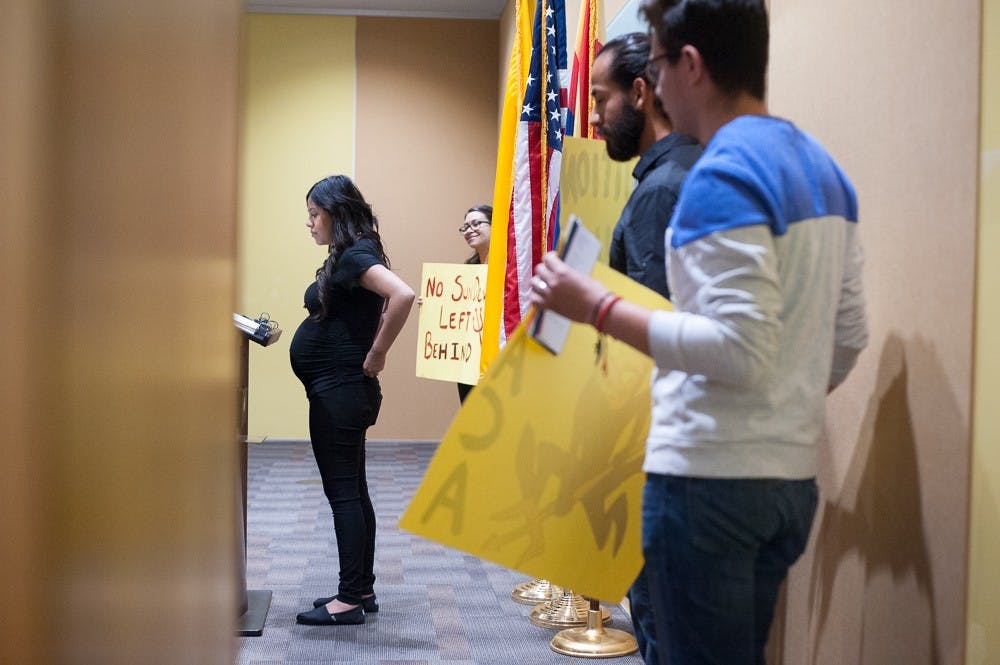After the Arizona Board of Regents ruled to allow Deferred Action for Childhood Arrivals recipients pay in-state tuition for all Arizona public universities, many DREAMers, as the recipients are often referred to, came together to celebrate what this victory truly means.
“We are DREAMers, mighty, mighty DREAMers!” echoed throughout ASU’s Student Center at the Post Office during a press conference Friday as several DREAMers and their supporters came together to discuss Thursday's ruling made by Maricopa County judge Arthur Anderson that overturned a 2013 lawsuit.
DREAMers meet to celebrate a recent victory: in-state tuition for all Arizona public universities @statepress pic.twitter.com/qlQZxZQgiy
— Jessica Suerth (@suerthjessica) May 9, 2015
Daniel Ortega Jr., one of the lawyers who helped fight for the equal rate of tuition, thanked DREAMers for fighting for their education.
“As I said previously, let’s celebrate education,” he said. “When it comes to the legal aspects of this case, we started turning the wheels of justice. The wheels move slowly, but the important thing is that they move.”
DACA recipients are given a two-year, renewable citizenship status if they are younger than 31, came to the U.S. before the age of 16, have lived in the country continuously for at least five years and have graduated from high school, earned a GED or are currently in high school.
Now, these same students are celebrating a fight that has been many years in the making: allowing DREAMers to pay in-state tuition at all Arizona public universities.
In June 2013, Attorney General Tom Horne filed a lawsuit against Maricopa Community Colleges because he believed the DACA policy violated Proposition 300, a law that banned providing public benefits to undocumented immigrants. Ortega said involving DREAMers in the fight for in-state tuition made it all the more powerful.
“We didn’t want it to be Tom Horne v. MCC, we wanted it to be Tom Horne v. MCC and actual, real DREAMers,” he said. “Tom Horne’s case is dismissed.”
In-state tuition for all Arizona public universities — ASU, UA and NAU — has increased slightly after ABOR approved tuition increases in order to help make up for Arizona Gov. Doug Ducey’s cuts to public education, which will reach about $100 million for the 2015-2016 school year.
Manny Natera, the DACA clinic coordinator with Scholarships AZ, said ABOR’s decision was a victory not only for DACA recipients, but the state of Arizona as a whole.
“We have been fighting very hard for the community and we believe justice has won this time,” he said. “Over 20,000 people are now eligible to pay in-state tuition at all public universities. This victory is not something that happened by itself and we shouldn’t take it for granted.”
Natera said this opportunity will give him and many others like him the realistic opportunity of attending college in Arizona, but the fight still continues for equal financial aid.
“As DACA recipients, we need and deserve institutional and state financial aid,” he said. “Let us not forget that just because our tuition is lowered, most of it will be coming out of our own pockets. Education is a right and tuition equity is something that everyone should be able to get, regardless of immigration status.”
Graduate and Professional Student Association president German Cadenas, who arrived in the U.S. from Venezuela when he was just 15, said he could not believe this day had come.
“There was no future for me here in Arizona anymore,” he said after explaining how he got rejected from public universities twice due to his immigration status. “I thought, ‘I’m going to show them that I can do this.’”
.@asu_gpsa pres German Cadenas: "This week, we correct a wrong." #ASU #DACA @statepress pic.twitter.com/wwedbTvJrN
— Ben Moffat (@bmoffatphotos) May 9, 2015
Cadenas went on to graduate from ASU, a victory that many undocumented immigrants may now have the opportunity to experience.
“This week, we have corrected a wrong,” he said. “This week, we make sure that no DREAMers ever went through what I went through again.”
Reach the reporter at Jlsuerth@asu.edu or follow @SuerthJessica on Twitter.
Like The State Press on Facebook and follow @statepress on Twitter.




